Medical Disclaimer: This article is for informational purposes only and does not substitute professional veterinary advice. Always consult your veterinarian before changing your dog’s diet or adding supplements.
Table of Contents
Introduction
When Max, a cheerful Miniature Schnauzer, came into my clinic with stomach discomfort, his owner was genuinely puzzled. She had recently started adding a drizzle of avocado oil to his food, thinking it was a healthy upgrade. After all, avocado oil is often praised in human nutrition for its heart-healthy fats and antioxidants. But for dogs? That’s where things get a bit murky.
As a veterinarian in general practice, I’ve seen more than a few cases like Max’s dogs with digestive upset, vomiting, or even early signs of pancreatitis, all traced back to well-meaning dietary changes. And avocado oil is a common one. So, let’s break down the facts, separate hype from evidence, and explore whether this trendy oil has a place in your dog’s bowl or if it’s better left in the kitchen.
🐾 Key Takeaways: Avocado Oil for Dogs
- Avocado oil for dogs is non-toxic, but its high fat content can trigger pancreatitis, especially in breeds like Schnauzers or overweight dogs.
- Nutritional perks include omega-3 fatty acids, vitamin E, and antioxidants, which may support coat health and joint comfort yet these are more reliably provided by fish oil or salmon oil.
- Veterinary consensus leans cautious: benefits are limited, and risks like digestive upset or weight gain often outweigh them.
- Topical use can help dry skin, but ingestion should be limited and monitored.
- Safer dog-safe oils like salmon, fish, or flaxseed oil are typically preferred.
- Always consult your vet before adding any oil to your dog’s meals.
Is Avocado Oil Safe for Dogs?
You Can Also Visit: https://doglifeexpert.com/understanding-dog-respiratory-issues/
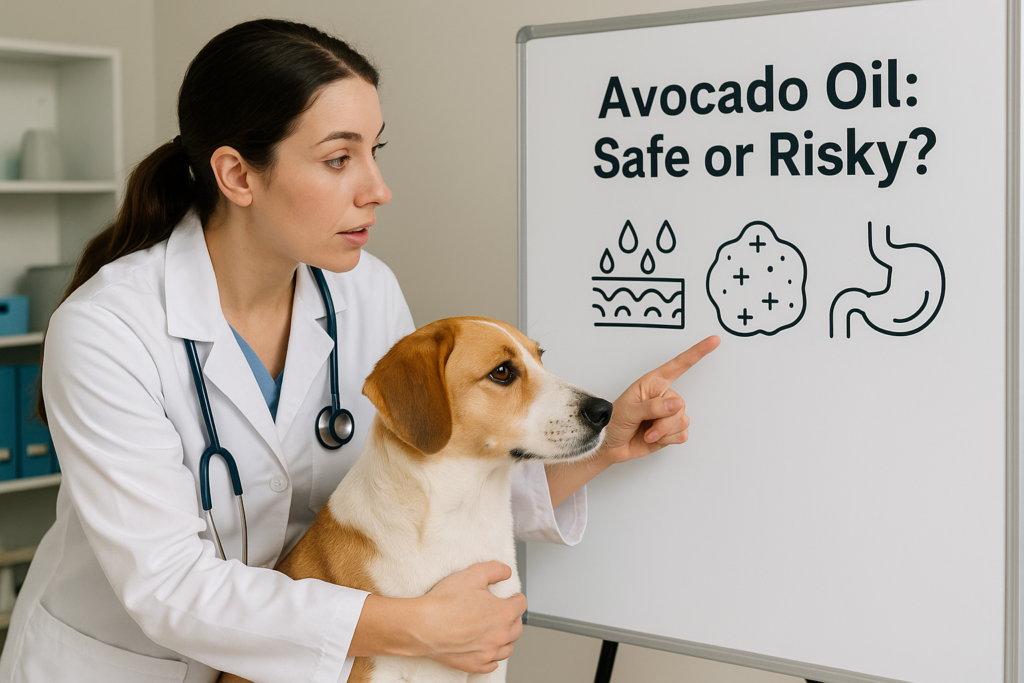
When exploring dog nutrition trends, avocado oil for dogs often comes up as a “superfood.” But just because it’s trendy doesn’t mean it’s risk-free. Let’s break down the safety concerns that every dog owner should know before adding this oil to the bowl.
Understanding Persin and Fat Content
Avocado oil is pressed from the fruit’s flesh and contains no persin, the toxin found in avocado pits, leaves, and skins. That makes the oil itself non-toxic for dogs, unlike raw avocado.
However, avocado oil is very high in fat and that’s where the real risk lies. Just one teaspoon delivers about 120 calories and 14 grams of fat, making it a dense addition to any dog’s diet. While healthy fats like oleic acid and omega-3s may support skin and coat health, they can also overload your dog’s pancreas if not managed carefully.
Breeds and Conditions at Higher Risk
Not all dogs react the same way to fatty foods. While some may tolerate small amounts of avocado oil for dogs without issue, others are much more susceptible to adverse effects particularly when it comes to fat-induced conditions like pancreatitis or obesity.
Here are the groups of dogs that require extra caution:
Miniature Schnauzers & Yorkshire Terriers
These small breeds are genetically predisposed to hyperlipidemia, a condition characterized by abnormally high levels of fat in the blood. This makes them particularly prone to developing pancreatitis, even from moderate fat intake. As a veterinarian, I’ve seen multiple cases where just a teaspoon of a fatty supplement triggered a painful flare-up in these breeds.
Overweight or Obese Dogs
Dogs carrying excess weight already have compromised metabolic function. Their systems struggle to process added dietary fat, making them vulnerable to digestive upset, inflammation, and further weight gain. For these pets, even small additions of avocado oil can tip the balance and worsen conditions like insulin resistance, arthritis, or heart strain.
Senior Dogs
As dogs age, their metabolic rate slows, and their ability to break down fats diminishes. Older dogs may also have undiagnosed health conditions, such as low-grade pancreatitis or gallbladder issues, which increase their risk of reacting poorly to new high-fat foods.
Dogs with Digestive Sensitivities or GI History
If your dog has a past of chronic diarrhea, vomiting, food allergies, or inflammatory bowel disease (IBD), their gut lining is already compromised. Adding avocado oil for dogs to their meals could irritate their digestive system, leading to discomfort, reduced nutrient absorption, or full-blown gastrointestinal upset.
💡 Important Tip: If your dog fits any of these risk profiles, it’s best to avoid avocado oil altogether and explore safer alternatives like fish oil or flaxseed oil, which provide similar nutrients with lower fat risks.
Signs of Negative Reactions to Avocado Oil
While avocado oil for dogs may be marketed as a nutritious supplement, it can trigger serious health problems in certain dogs especially those with sensitive digestive systems or a predisposition to pancreatitis. One of the most concerning complications is acute pancreatitis, a condition that can escalate quickly and requires immediate medical attention.
Here are the key signs to watch for if your dog has recently consumed avocado oil:
- Vomiting and Diarrhea: These are often the first and most obvious indicators. They may occur within hours of ingestion or develop gradually over a day or two. The vomiting may be bile-tinged or foamy, and diarrhea may range from soft stools to watery or mucous-filled episodes.
- Lethargy and “Prayer Position” Posture: Dogs with abdominal pain often adopt a unique stance forelegs stretched out in front, hindquarters raised known as the “prayer position.” This is their way of relieving pressure in the abdomen. Coupled with low energy or reluctance to move, it’s a red flag for internal discomfort.
- Loss of Appetite: A normally food-motivated dog refusing meals or treats is always cause for concern. Inflammation in the pancreas or gastrointestinal tract often suppresses appetite significantly.
- Fever and Abdominal Tenderness: You may notice your dog feeling warm to the touch or flinching when you gently touch their belly. This tenderness is due to inflammation in the digestive organs and can signal a progressing condition.
If your dog shows any combination of these symptoms after introducing avocado oil, stop using it immediately and contact your veterinarian. Even mild cases of pancreatitis can become severe if untreated, and prompt care greatly improves outcomes.
Benefits of Avocado Oil for Dogs
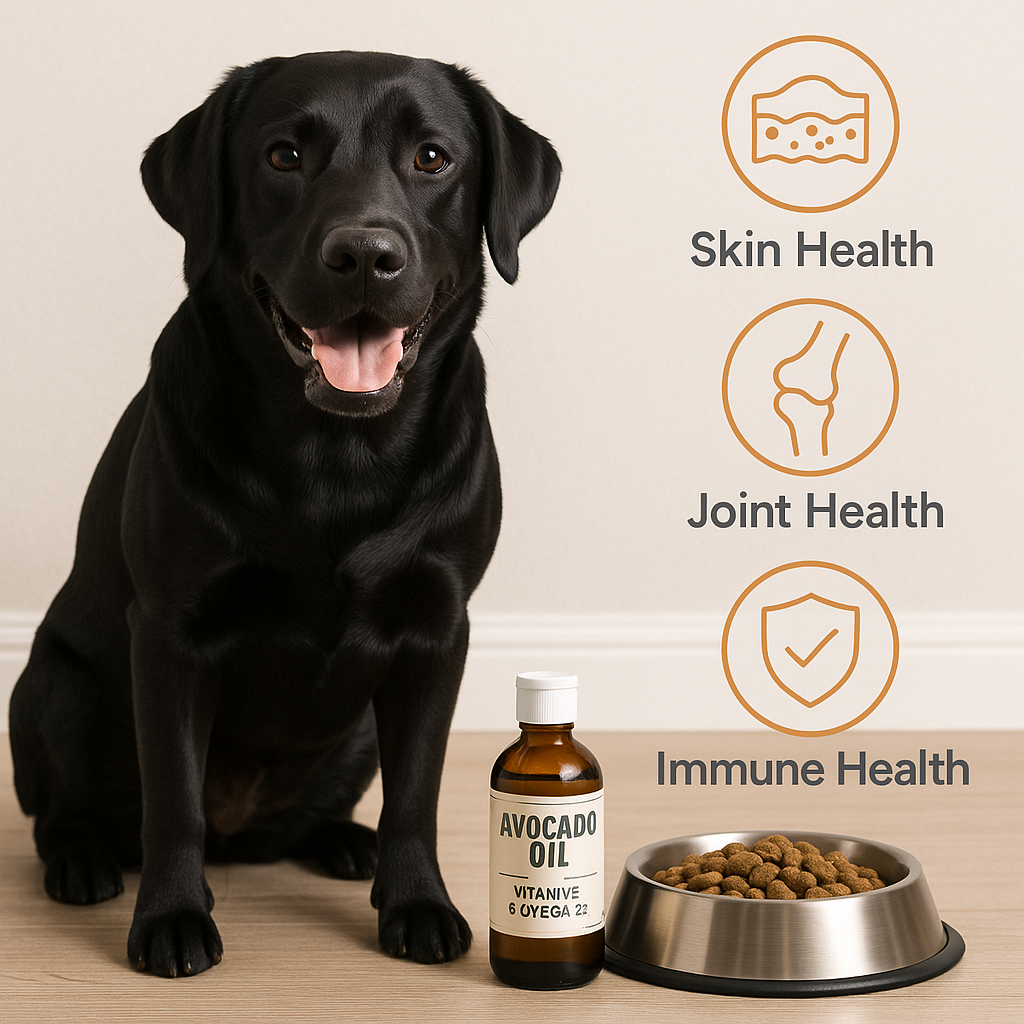
Despite its risks, avocado oil for dogs does offer some nutritional perks especially when used cautiously and in small amounts. Let’s explore how this oil might help support your dog’s health, based on current research and veterinary insight.
Skin and Coat Health
One of the most promoted benefits of avocado oil for dogs is its impact on skin and coat. It’s rich in:
- Omega-3 fatty acids, which can reduce inflammation and itching in dogs with allergies.
- Vitamin E, a powerful antioxidant that supports skin barrier health and a shiny coat.
Many dog-safe shampoos, such as VetCBD Hemp’s topical blends, include avocado oil to help hydrate dry or flaky skin. When used externally, it’s often safe and effective.
Joint Support
While less studied than fish oil, the oleic acid and phytosterols in avocado oil may provide mild anti-inflammatory effects, potentially aiding dogs with joint stiffness or arthritis. However, more robust evidence supports salmon oil or fish oil for joint health, especially in aging pets.
Immune and Antioxidant Effects
Avocado oil for dogs contains lutein and other antioxidants that can support immune health and protect cells from oxidative stress. These compounds may help reduce inflammation linked to chronic disease but again, these benefits aren’t unique to avocado oil.
Topical vs Ingested Use
Used topically, avocado oil can help moisturize rough paw pads, elbows, or dry spots especially in winter. Just be sure your dog doesn’t lick it off. Internally, any benefits should be weighed against the high fat content and individual risk factors.
How to Use Avocado Oil Safely
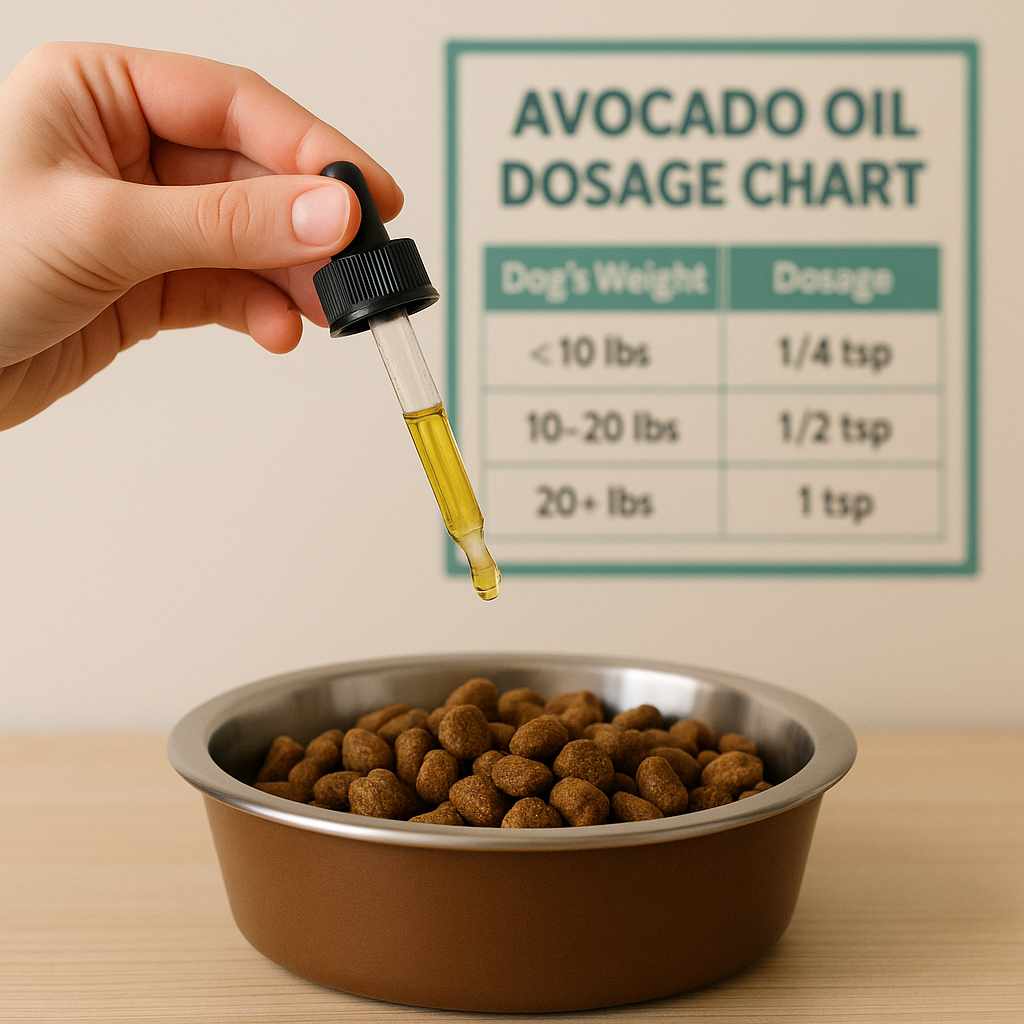
If you still want to try avocado oil for dogs, it’s crucial to follow safe usage guidelines. Proper dosing, gradual introduction, and high-quality sourcing can make all the difference in avoiding unwanted side effects.
Dosing Guide by Weight
A small amount goes a long way. Here’s a general starting point:
| Dog Weight | Daily Max Amount |
|---|---|
| Under 10 lbs | ¼ teaspoon |
| 10–25 lbs | ½ teaspoon |
| 25–50 lbs | ¾ teaspoon |
| Over 50 lbs | 1 teaspoon |
Only use once daily, mixed into food not as a treat on its own. Never exceed these limits unless advised by your vet.
Gradual Introduction & Monitoring
Introduce avocado oil for dogs over 5–7 days:
- Start with half the recommended amount.
- Observe for digestive upset (loose stools, vomiting, or loss of appetite).
- If all is well, slowly work up to the full dose.
Discontinue use if any symptoms appear and consult your veterinarian.
Choosing a Quality Oil
Choose high-grade, cold-pressed, organic avocado oil. Look for:
- No additives, preservatives, or flavoring
- Glass packaging (to prevent chemical leaching)
- A product labeled for culinary or human-grade use
One popular option is Hemp Well Organic Avocado Oil, which avoids chemical residues often found in low-cost oils.
Safer Alternatives to Avocado Oil
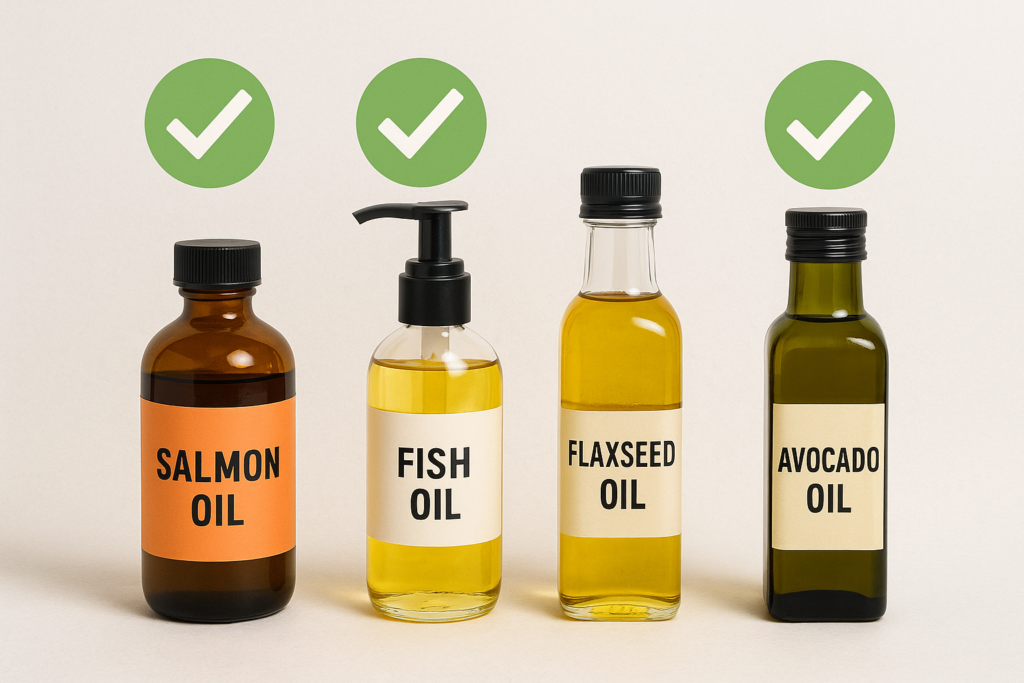
For pet parents seeking healthy fats for their dog’s diet, there are better-researched and lower-risk options than avocado oil for dogs. These alternatives offer similar benefits without the high fat burden.
Salmon Oil
A top vet-recommended supplement, salmon oil is:
- Rich in EPA and DHA, proven to reduce inflammation, improve skin, and support brain function.
- Typically lower in saturated fat compared to avocado oil.
Look for vet-formulated brands like Grizzly Salmon Oil, which are purified and dosed specifically for dogs.
Fish Oil
Fish oil (from anchovies, sardines, or mackerel) is one of the most clinically studied dog-safe oils. Benefits include:
- Shinier coat
- Relief from seasonal allergies
- Better joint function in aging dogs
Choose products with a guaranteed EPA/DHA content and vet-approved dosing.
Flaxseed Oil
Ideal for dogs with fish allergies, flaxseed oil provides plant-based omega-3s (ALA). It supports:
- Coat health
- Mild inflammation control
- Added fiber for digestion
But keep it refrigerated and use it fresh flaxseed oil spoils quickly.
Coconut Oil
Coconut oil is often used topically for itchy skin or minor wounds. It contains lauric acid, which has antibacterial and antifungal properties.
- Internal use can support digestion, but moderation is key it’s still high in fat.
- A little dab on dry skin can work wonders when licking is controlled.
Summary Table: Safer Alternatives
| Oil Type | Key Benefits | Notes |
|---|---|---|
| Salmon Oil | EPA/DHA for skin, joints, brain | Vet-preferred; lower fat than avocado |
| Fish Oil | Skin, coat, heart, immune health | Widely studied, safe for most dogs |
| Flaxseed Oil | Plant-based omega-3s; supports digestion | Great for fish-allergic dogs |
| Coconut Oil | Skin hydration, antibacterial use | Best used topically or in small doses |
Typical Canadian Costs for Dog-Safe Oils
Adding avocado oil for dogs or its safer alternatives to your pet’s routine can vary widely in cost. Here’s a snapshot of average prices across Canada (based on July 2025 data):
| Product | Average Cost (CAD) | Monthly Use (Med. Dog) | Notes |
|---|---|---|---|
| Cold-Pressed Avocado Oil | $12–$20 / 250mL | ~1 bottle/month | Higher fat content; use cautiously |
| Salmon Oil (Dog-Specific) | $25–$40 / 500mL | ~½ bottle/month | Vet-recommended; high in EPA/DHA |
| Fish Oil Capsules | $18–$30 / 90 caps | 1–2 caps/day | Easier for dosing and storage |
| Flaxseed Oil | $10–$18 / 250mL | ~1 bottle/month | Must be refrigerated after opening |
| Coconut Oil | $12–$22 / 400mL jar | ~1 jar every 2 months | Mostly used for topical application |
💡 Tip: Always check that supplements are free from xylitol, artificial flavors, and other additives not safe for dogs.
5-Minute Home Checklist Before Using Avocado Oil for Dogs
Before adding avocado oil for dogs to your pet’s meal, use this quick checklist to avoid common mistakes:
✅ Spoke to your veterinarian?
Always consult your vet first especially if your dog has a history of pancreatitis, obesity, or food sensitivities.
✅ Identified your dog’s risk factors?
Small breeds like Schnauzers or overweight dogs are at higher risk for fat-related issues.
✅ Using cold-pressed, dog-safe avocado oil?
Choose human-grade, unflavored oil without additives. Avoid cooking-grade blends or cheap grocery brands.
✅ Measured the correct dose?
Start with ¼ tsp for small dogs or 1 tsp for large breeds, introduced slowly over a week.
✅ Monitoring for adverse signs?
Check for vomiting, loose stool, lethargy, or refusal to eat. If you notice any, discontinue use.
💬 Bonus Tip: Keep a weekly food journal when trying any new oil to track reactions and overall well-being.
Vet-Approved Prevention Tips

To help keep your dog healthy while exploring dietary fats like avocado oil for dogs, here are some simple, preventive measures recommended by veterinarians:
🩺 Talk to Your Vet First
Before adding any supplement even dog-safe oils consult your vet. They’ll evaluate your dog’s weight, breed, current diet, and health conditions to ensure it’s the right fit.
🐶 Choose Oils Formulated for Dogs
Use supplements specifically labeled for canine use. These products are more likely to have appropriate dosing instructions and undergo quality checks for pet safety.
🧪 Monitor Weight and Energy
High-fat oils can sneak in extra calories. Regularly check your dog’s weight and body condition, especially if adding avocado oil to their routine.
🥣 Keep It Simple
Avoid combining multiple supplements at once. Introduce only one new ingredient at a time so you can clearly track any changes or adverse effects.
🚫 Never Give Raw Avocado
Remember, while the oil is free of persin, avocado flesh, pit, and skin are toxic to dogs. Stick to the oil and in moderation.
📅 Rotate Oils Occasionally
If your dog tolerates supplements well, rotating between fish oil, flaxseed oil, or avocado oil seasonally can help diversify nutrient intake without overloading one source.
Frequently Asked Questions (FAQs)
1. Is avocado oil toxic to dogs?
No. Unlike avocado flesh or pits, avocado oil for dogs does not contain persin and is considered non-toxic. However, it’s very high in fat, which can lead to pancreatitis or digestive upset, especially in sensitive breeds.
2. Can I apply avocado oil on my dog’s skin?
Yes, avocado oil can be used topically to moisturize dry skin or cracked paw pads. Make sure your dog doesn’t lick it off, and use only a few drops at a time.
3. How much avocado oil is safe for dogs?
Start with ¼ teaspoon for small dogs and up to 1 teaspoon for larger dogs. Always mix it with food and introduce it slowly over several days to monitor for adverse reactions.
4. Are there better oils than avocado oil for dogs?
Yes. Salmon oil, fish oil, and flaxseed oil are widely recommended by veterinarians as safer, more effective dog-safe oils with proven benefits for skin, coat, and joints.
5. Can puppies have avocado oil?
It’s best to avoid avocado oil for puppies. Their digestive systems are still developing, and high-fat foods increase the risk of gastrointestinal upset or nutrient imbalance.
6. Is organic avocado oil better?
Yes. Use cold-pressed, organic avocado oil without added flavorings or chemicals. Human-grade oils with minimal processing are safer for canine consumption.
Final Thoughts
Avocado oil for dogs is not inherently toxic, but it isn’t without risk. While it offers some benefits like omega-3 fatty acids, vitamin E, and antioxidants its high fat content makes it unsuitable for many pets, especially those with weight issues or a history of pancreatitis.
In my veterinary experience, the majority of pet owners seeking a supplement for coat health or joint support do better with safer dog-safe oils like salmon or fish oil. These alternatives are more thoroughly studied and easier to dose properly without pushing your dog’s fat intake too high.
If you do choose to use avocado oil for dogs, prioritize safety: start small, choose a high-quality product, and always involve your veterinarian in the decision. Your dog’s health isn’t worth the gamble, especially when better options are readily available.

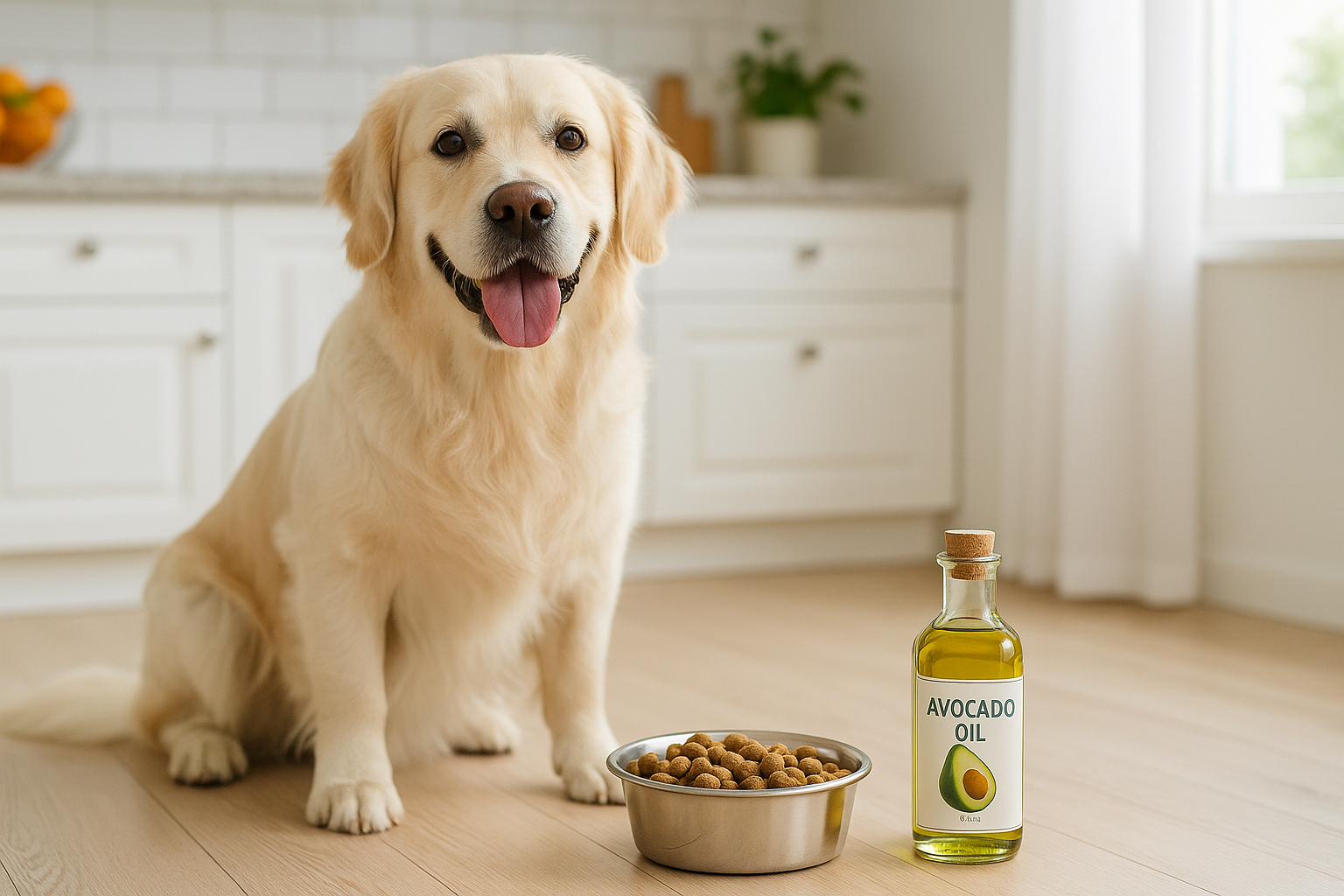



Pingback: “7 Critical Dog Stress Signs Vets Want You to Notice”